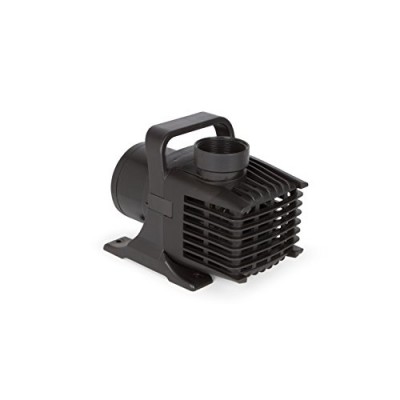Pond Pumps Canada is part of the Amazon Affiliate Network. We may receive payment for items purchased through the Amazon website.
Atlantic'S TidalWave TT-Series pumps are the next generation of ultra-high effeciency ansynchronous pumps. Offering flows from 1500 to 9000 gallons per house, these powerhouses are compact to fit the tightest spaces, opening up a whole new range of applications. The TT-Series is specifically designed to be clog-resistant and hard water-tolerant, making them the perfect choice for all high flow, medium head applications.
Features- Max Pump Flow - 5150
- Max Head - 21 ft.
- Volts - 115
- Amps - 2.7
- Watts - 310
- Inlet - 2 in. MIPT
- Outlet - 2 in. FIPT
- Dimensions - 9 .25 L x 6 W x 7 H in.
- Asynchronous Pumps combine the efficiency of Magnetic Induction with the power of Direct Drive geometry, keeping operating and ownership costs to a minimum
- Atlantic TT-Series pump more water for less watts regardless of water chemistry, making them the ideal choice for water gardens
- Compact design fits the tightest pump chambers, perfect for vertical and multiple pump applications
- Excellent resistance to fouling in hard water environments and simple maintenance keeps pumps running in adverse conditions
- Ribs and large openings in pre-filter and handle provide tremendous surface area for greater clog resistance, decreasing upkeep and increasing pump life
Atlantic Water Gardens Pond & Waterfall Pump, Energy Efficient & High Flow Rates, 5000 GPH
- Brand: Tidal Wave
- Product Code: TT5000
- Availability: In Stock
Dynamic Head
The effect of the Earths gravity on the "lift" or head pressure is fairly simple; for every vertical foot of distance the pump moves the water you are adding one foot of head pressure so the ratio is a 1:1 ratio. The effects of the friction, caused by water as it travels through your hose or pipes, on the total head pressure is a little more difficult to calculate especially as there are slight variations in pipe friction in different hose materials and the smoothness of the inner bore. Basically. for every ten feet of pipe through which the water has to travel travel horizontally will contribute 1 foot of head height; the ratio of the pipe friction loss is a 10:1 ratio.Plumbing fixtures and bends and corners in your hose also increase the total head you must calculate to ensure the proper final volume from your pump. Every corner with a 90 degree elbow in your plumbing will add 1 foot of head pressure with a 1:1 ratio. 45 degree elbows, tees and even insert couplers can all have an impact on the final flow.
If you install a pump 40 feet away from the top of your waterfall which is 6 feet above the pump and the tubing is a single run of 40 feet horizontally then you add 4 feet of head for the tubing length (the 10:1 ratio) to the 6 foot differnetial between the pump location and the final height of the waterfall so your final total dynamic head calculation would be 10 feet. This means your final volume of water flow in this water feature or application would be the volume of flow on the performance curve that equaled the gallons per hour at 16 feet. This volume will certainly be much less than the initial volume the pump can move at an open flow or a zero head.
If in the above example your 40 feet of horizontal tubing run also required 3 elbows of 90 degrees then an additional 3 feet of theoretical head would be added and your final flow result would be at 19 feet on the performance curve of the pump. In this example you would want to choose a pump that has the desired GPH rating at 9 feet of head pressure. Tubing size is also an important factor in accounting for head pressure loss, in general you should never reduce the diameter of the tubing below what the output size of the pump is, this will drastically increase head pressure, and reduce pump performance. For maximum pump performance, using the largest tubing that is practical is the best choice. A best practice is to use a hose with an inner diameter that is the same as your pumps outlet fitting.

